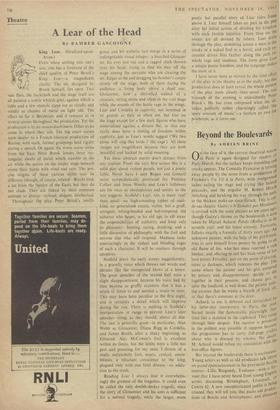Theatre
A Lear of the Head
By BAMBER GASCOIGNE
ii EVEN when settling into one's seat, one has a foretaste of the chief quality of Peter Brook's King Lear—a magnificent clarity. The set, designed by Brook himself, lies open. Two vast flats,. the backcloth and the stage itself are all painted a subtle whitish grey, against which a table and a few utensils stand out as vividly and solidly as chunks of metal on light silk. The effect so far is Brechtian, and it remains so in several scenes throughout the production. Yet the production is by no means doctrinaire. Other styles come in where they suit. The big court scenes seem nearer to a French classical production of Racine, with stark, formal groupings held rigidly during a speech. Or again, the storm scene sterns from the East. Peter Brook lowers three rec- tangular sheets of metal which tremble in the air while the actors on the empty stage beneath mime their battle with wind and rain. The pre- cise origins of these various styles may be different (though, of course, related—Brecht took a lot from the theatre of the East), but they do not clash. They are linked by their common attitude to drama— stylised, elegant, intellectual.
Throughout the play Peter Brook's intelli-
gence and his esthetic tact merge in a series of unforgettable visual images: a hunched Glouces- ter, his eyes just out and a ragged cloth thrown over his head, trying to find his way off the stage among the servants who are clearing the set; Edgar at the end dragging his brother's corpse slowly off the stage, both of them facing the audience, a living body abOve a dead one; Gloncester, now a shrivelled walnut of a creature, sitting alone and silent in the vast stage while the sounds of the battle rage in the wings;
Lear and Cordelia in captivity, not hemmed in by guards as they so often are, but free on the stage except for a few dark figures who have materialised against a distant flat, so that one really does have a feeling of freedom within captivity, just as• Lear's words suggest ('We two alone will sing like birds i the cage'). All these images are magnificent because they are both bettUtiftil and backed by solid meaning.
Yet these abstract merits don't detract from any realism. From the very first scenes this is .a solid play about violent people, not just a poetic fable. Never have I seen Regan and Goneril more sympathetically portrayed (by Patience Collier and Irene Worth) and Lear's followers are for once as obstreperous and unruly as the text suggests..Scofield's Lear, too, is more 'real' than usual--no high-sounding cipher of man- kind, no generalised cosmic victim, but a gruff, arrogant, wrong-headed and hot-tempered old autocrat who hopes, in his old age, to sift away the _responsibilities of authority and keep only its pleasures: hunting, eating. drinking, and a little discussion of philosophy with the fool and anyone else who will respond. Madness lurks convincingly in the violent and blinding rages of such a character. It will be madness through apoplexy.
Scofield plays the early scenes magnificently, in a gravelly voice which throws out words and phrases like the unexpected blows of a boxer. The great speeches of the second half were a slight disappointment, because his voice had by then become so gruffly eccentric that it was a strain to listen to and seemed a strain to utter. This may have been peculiar to the first night, and is certainly a detail which will improve during the run. There is nothing in Scofield's, interpretation or range to prevent Lear's later speeches rising, as they should, above all else. The cast is generally good—in particular, Alan Webb as Gloucester, Diana Rigg as Cordelia, and James Booth, after a shaky beginning, as Edmund. Alec McCowen's fool is excellent within its limits, but the limits were a little too pert and prancing for my taste. 1 dream of a really melancholy fool, weary, cynical, unam- bitious, a reluctant conscience to the king, plagued only with one fatal disease –an addic- tion to the truth.
Reading Lear I always find it overwhelm- ingly the greatest of the tragedies. It could even be called the only double-decker tragedy, since the story of Gloucester and his sons is sufficient for a normal tragedy, while the larger, more
poetic but parallel story of Lear rides freelY above it. Lear himself takes no part in the plot after hi i initial action of dividing his kingdom with such foolish injustice. From then on the events are all devised by others. Lear drifts
through the play, stumbling across a man in the
en- stocks or a naked fool in a hovel, and each counter drives him farther along the path to- wards rage and madness. The form gives Lear a unique poetic freedom, and the language makes the most of it.
I have never been as moved by the total effect of the play in the theatre as in the study; but this production does at least reveal the whole pattern of the play more clearly than usual. The real triumph of the evening is undoubtedly peter Brook's. He has even composed what the ad- vance publicity rather charmingly called the spare amount of music'--a fanfare or two for post horns, as it turns out.






































 Previous page
Previous page